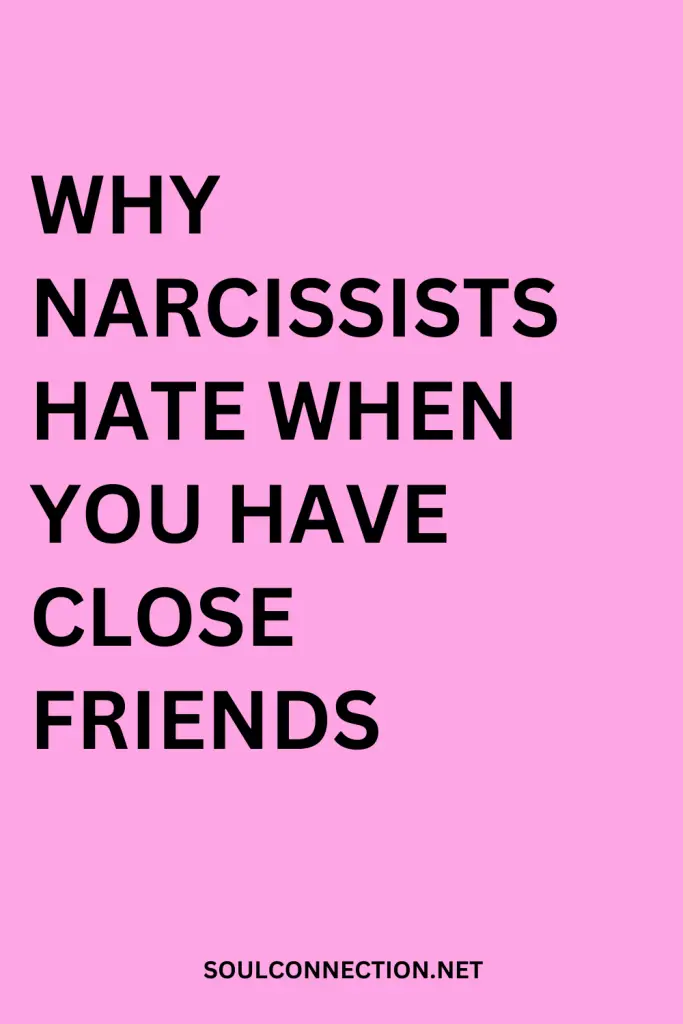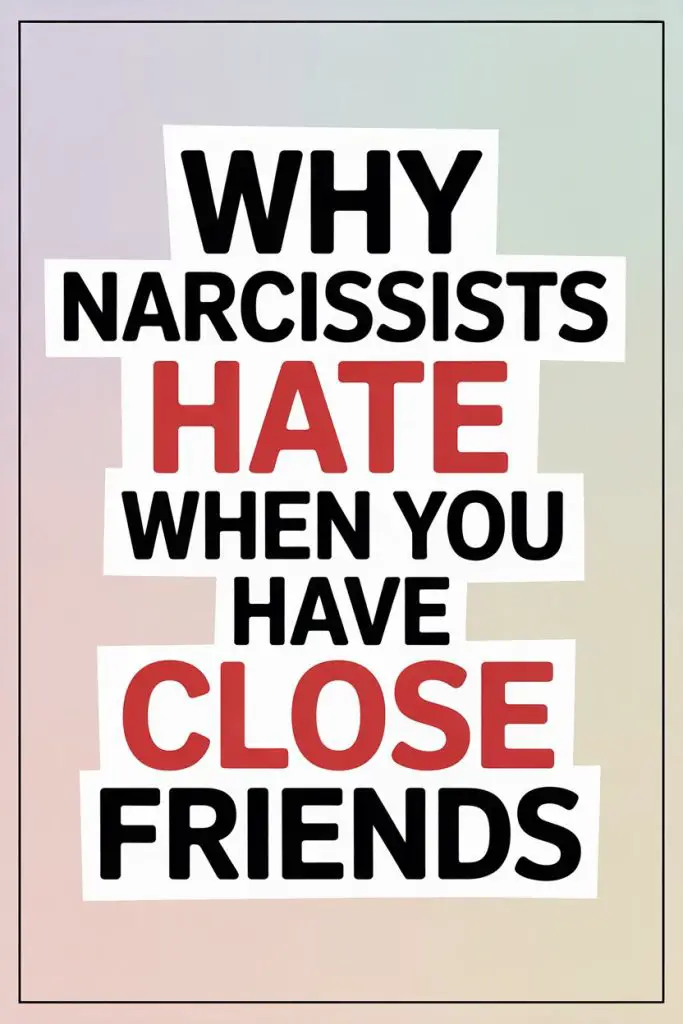Nothing throws a narcissist into a silent, sulky spiral quite like you laughing with your mates.
If you’ve ever watched your partner’s eyes narrow when you talk about brunch plans or felt the temperature drop when your friend’s name lights up your phone, welcome to the club.
It’s not just garden-variety jealousy—it’s a unique brand of possessiveness that can warp even the strongest relationships.
Time to peek behind the curtain and see what’s really going on.
The Narcissist’s Need to Be the Center of Your Universe
Narcissists are powered by attention. Not the casual, “Hey, nice shirt!” kind—but the total, undivided, worshipful sort. Imagine a toddler at a birthday party throwing a tantrum because someone else got the bigger slice of cake.
When you have close friends, suddenly someone else is getting a bit of that spotlight. Your inside jokes, late-night chats, and supportive texts are a threat to their main-character energy.
They might not shout it from the rooftops, but every sparkling friendship chips away at the fantasy that they’re your whole world.
So, if you ever catch them sighing dramatically when you mention meeting Sarah for coffee…that’s not random.
Friends Are Your Reality Check
A narcissist’s best trick is rewriting reality, one gaslit conversation at a time. But friends? Friends are immune to that particular magic trick.
When you start to question your own memory or feelings, your friends are the ones who remind you that—no—you’re not actually losing your mind.
That’s terrifying for a narcissist. They rely on you doubting yourself, second-guessing your instincts, and needing their approval.
When you have a strong support system, you’re a lot less pliable, and a whole lot harder to manipulate. The narcissist’s scripts start to flop, and that’s no fun for them at all.
Jealousy Disguised as Concern
You’ll notice it’s rarely, “I don’t want you to see them!” (unless they’re dropping the mask). It’s, “I just worry they’re not good for you,” or “They seem kind of jealous of us.”
Your friend Sally, who once brought you soup when you had the flu, is suddenly public enemy number one.
Jealousy from a narcissist is never straightforward. It hides behind concern, fake empathy, or sudden critiques of your friends’ character.
The real problem? Your friendships compete for the time, attention, and validation the narcissist thinks should be theirs—and theirs alone.
The Isolation Tactic
Narcissists don’t always want you totally alone—they just want you dependent on them. If they can subtly, or not-so-subtly, nudge your friends out of the picture, life gets a whole lot easier for them.
You might hear things like, “Why do you even bother with them?” or, “They don’t have your best interests at heart.”
Before long, you could find yourself seeing friends less, missing out on group chats, and feeling like your social world is shrinking. This isn’t an accident.
The fewer close connections you have, the easier it is for the narcissist to control you and keep you in their emotional orbit.
Friends Spot the Red Flags
Narcissists are charming—at first. But your friends are often the ones to notice the cracks.
They’ll spot the patterns: the constant need for praise, the subtle digs, the way you seem a little more anxious than you used to.
A narcissist knows this, and the idea of being “figured out” by your mates is deeply uncomfortable. So, they might start planting seeds of doubt about your friends, steering you away from the ones who see them most clearly.
Don’t be surprised if you start hearing, “I just don’t vibe with your friends,” right after your best mate gives them the side-eye at dinner.
Loyalty Is a Threat
Narcissists crave loyalty—but only if it’s laser-focused on them. When you have close friends, especially ones you’ve known longer than the narcissist, that shared history is intimidating.
Maybe you have childhood besties who know your embarrassing secrets or college pals who stood by you during the worst break-up of your life.
The narcissist can’t compete with those bonds, and it eats at them. Instead of trying to build rapport, they’ll subtly criticize your friends or guilt-trip you for choosing them over “quality time” together.
You might start to feel torn, but it’s not your loyalty that’s the problem—it’s their insecurity.
Friends Give You Somewhere to Go
This one stings for narcissists. If you have close friends, you always have a soft place to land. If things go sideways, you’re less likely to tolerate the narcissist’s games because you know you’ve got backup.
The narcissist relies on you feeling isolated and dependent. Friends are your escape hatch, the ones who will help you pack your bags or just offer a sympathetic ear when you need it.
That safety net means you’re less likely to stick around for emotional gymnastics—and the narcissist knows it.
Control Slips Away
Control is the name of the game.
If you have other people to talk to, laugh with, or confide in, the narcissist’s grip starts to loosen. Every time you choose friends over their needs, you remind them that you have a life outside the relationship.
Watch for attempts to guilt-trip you for spending time with others, or sudden drama whenever you make plans without them. It’s not about loving you so much they can’t stand to be apart. It’s about keeping the upper hand.
Friends Remind You Who You Were Before
The healthiest friendships hold up a mirror to your best self—the one with ambitions, hobbies, and opinions. Before the narcissist, you might have been the life of the party, the go-to for bad jokes, or just someone who wore neon socks because you could.
A narcissist, quite frankly, hates this kind of nostalgia. They’d prefer the only version of you to be the one they’ve shaped. Your friends remind you that you’re not just an extension of your partner.
And that’s exactly why the narcissist wants those reminders gone.
Spotting the Signs and Standing Your Ground
Worried your friendships are under siege? Watch for these hallmarks: subtle digs about your mates, reluctance to meet them, guilt trips when you make plans, or “concern” that always seems to end with you spending more time at home.
The antidote? Boundaries, boundaries, and—did I mention?—boundaries. Make it clear your friends are non-negotiable. Keep lines of communication open (group chats count as self-care).
If you’re feeling isolated, reach out to the people who knew you before the narcissist—and trust their read on the situation.
It’s not about picking sides. It’s about refusing to shrink your world to fit someone else’s insecurities.
Rebuilding Connection if You’ve Grown Isolated
If you’re reading this and realizing your social circle has thinned, there’s no shame—narcissistic partners are pros at slow-motion isolation.
The good news: true friends are often just a message away. Reach out. Apologize if you need to, but don’t wallow; genuine mates understand life gets complicated.
Start with a coffee, a walk, or even a WhatsApp catch-up. You don’t need to spill your relationship drama unless you want to.
The simple act of reconnecting is a statement: you’re reclaiming your space and your community.
Why Your Friends Matter More Than Ever
Close friendships are more than just fun—they’re your reality check, your backup, your chosen family. In relationships with narcissists, they might be the only thing standing between you and total emotional exhaustion.
If your partner seems unusually threatened by your friends, take it seriously.
It’s not just about jealousy. It’s about power, control, and making sure you never forget who you are—no matter how many times someone tries to rearrange the story.
Your friends aren’t just extras in the movie of your life. They’re the directors, the audience, and sometimes, the ones who hand you popcorn and whisper, “You can do better.”


